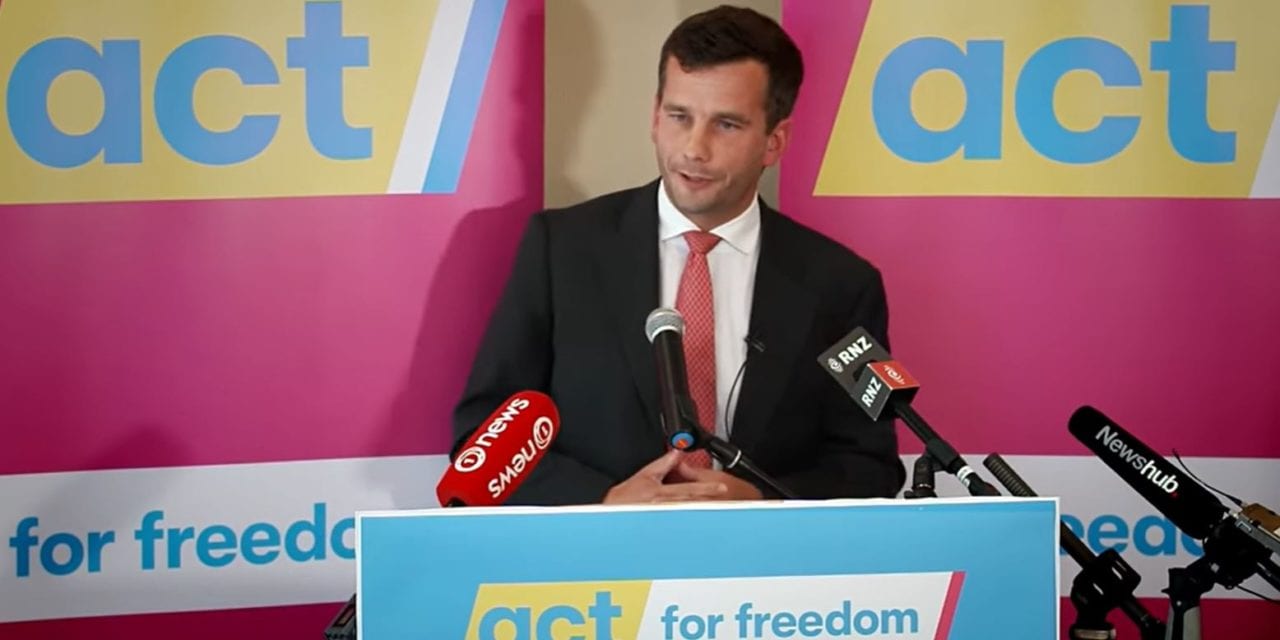ACT Party New Zealand State of Nation Talk 2020.
Listen now, or Subscribe free:
ACT New Zealand
Politics in Full Sentences – Podcasts NZ
School of Practical Politics
Episode Notes
Introduction
Thank you Beth and thank you to our wonderful ACT Party volunteers and President. Did you know our online donations averaged a thousand dollars per day for the hundred days before the election was called? ACT has its best momentum and support in a decade.
I want to thank Sang Cho and the team at Eden Bistro for opening up especially in Waitangi. Eden Bistro is a new business, and I think it’s going to be a big success. Here in the north of Mt Eden is one of the Epsom Electorate’s most exciting up-and-coming neighbourhoods.
Many people here are from the Epsom Electorate. I’m proud to represent you as your local MP. This month marks six years since I started my campaign to represent Epsom in 2014. This year I will be campaigning anew for my neighbours to send me to Wellington for a third time.
The state of Our Nation is strong. We are a democracy with a diversified free market economy. We have a rich civil society with voluntary organisations of every kind.
We saw in the aftermath of our nation’s tragedy in Christchurch that we may be the warmest people on earth. We are lively, entrepreneurial people who moved further than anyone for a better tomorrow.
We live on the greatest piece of physical real estate on earth.
The State of our Nation is strong. Our strength has been built up by generations. The question we need to ask ourselves is: Are we adding to or subtracting from the legacy we inherited up until today?
I want to talk about some issues we face as a country.
Erosion of Rights and Freedoms
Free Speech
The number one political issue is the erosion of freedom under this Government. The foundational freedom of any free society if freedom of speech. It is a good place to start.
The ACT Party says it’s a sacred right to think our thoughts and share our views. Freedom of speech allowed Galileo to say the Earth goes around the Sun. It allowed Kate Shephard to say Women have equal rights. Every chance of a better tomorrow depends on people thinking and speaking freely.
The current Government thinks free speech is dangerous. It doesn’t want you involved in planning tomorrow. If you are allowed to just think whatever you want, you might think the wrong thing!
That’s why they want so called hate speech laws. Someone, somewhere, will be employed by you to decide what you can say. If that sounds nuts, it is. But don’t blame me, I’m just describing their proposal honestly.
Normally when the state comes after you, you’re allowed to defend yourself with facts. You can’t be convicted of theft if you didn’t actually take something. When charged with hate speech, no fact can come to your defence. The question is simply whether you said something unpopular, it is mob rule at its worst.
It gets worse. Imagine a job that lets you punish the unpopular. Who would apply? Bad people, of course. The worst. We already have a guy called Paul Hunt in charge of the Human Rights Commission who thinks Jeremy Corbyn’s anti-Semitism is okay. That’s the sort of person we’re talking about giving the power to persecute.
The ACT Party says hate speech laws are wrong. A government dependent on ACT will never pass laws that restrict your speech. We will expect National to join with us in repealing any hate speech laws introduced in the dying days of this Government.
Firearm Laws
Free speech allowed ACT to point out that the Government’s firearm laws wouldn’t work, couldn’t work, and haven’t worked. Make no mistake, we are now less safe from gun violence than we were on the 14 March. For three reasons.
One. The buy-back failed. It didn’t just fail to get three quarters of the prohibited firearms; it got the least powerful firearms from the most honest people. Incidentally, they took the money and spent it on more firearms. Firearm retailers just had their best Christmas period since Jesus was a boy.
Two. Good policing relies on trust. The police are the public and the public are the police. Trust in the law and Police is at an all-time low amongst licensed firearm owners because of the rushed legislation. Most people follow laws they disagree with because they trust the process. They believe in parliamentary democracy. It’s difficult to describe how much our Parliament’s rushed gun laws have damaged the dignity of our democracy.
Three. They missed the real problem. How did an Australian weirdo on the wrong side of the Tasman get off a plane and buy an AR-15 with 3,000 rounds of ammo? A single male. Living alone. In another country. Who’d travelled to North Korea and Saudi Arabia. Where were the alarm bells going ding ding ding?
Now you understand why the Government and National rushed through their crazy laws. They’d done nothing about the woeful state of New Zealand’s firearm laws for a generation. They knew the public would soon turn on them if they didn’t act immediately, so they practiced collective punishment for the worst crime in our nation’s history on a group of people who’d done nothing wrong.
This election will decide whether we fix it, or things get worse. The Government can legislate a register before the election but they cannot implement one. ACT in Government would insist on reversing the second tranche of firearm laws, reintroducing the E-category, and getting the woeful Police out of firearm licensing and administration.
That’s the only way to solve the real problems that the Royal Commission will unveil, after the Government’s legislation.
The assault on firearm owners and free speech got attention because they made up the Government’s response to the Christchurch terror attacks.
Zero Carbon Act
The Zero Carbon Bill give more power to Government Ministers than any legislation since Muldoon. What’s worse, it will do nothing about its stated goal of reducing climate emissions. The legislation is so filled with escape hatches that it will never actually reduce emissions. How do I know this? The British have had the same law for over a decade. Their emission reductions per dollar of GDP have been no better than ours.
But it’s given a Minister the undemocratic ability to set plans for whole industries. A Government Minister setting carbon budgets will have the power to effectively decide whether steel, or aluminium is profitable or even if it survives.
ACT put up amendments that would remove those Ministerial Powers, making them come to Parliament before setting any kind of industrial plan. We also put up amendments saying New Zealanders should be able to use foreign carbon credits if they’re cheaper.
The Parliament, including National, voted against our proposed changes, so we didn’t support the bill.
Oil and Gas Exploration
Speech, firearms, and climate change are issues that get attention, but the erosion of freedom has happened in almost every policy area.
New Zealand is already a hostile environment for energy and mineral investment. This is crazy. There are probably more New Zealanders working in Australian mines than New Zealand ones.
The ban on oil and gas exploration is nuts. Announcing that the Government will allow no more exploration permits without Cabinet papers or consultation is a sure way to scare away the investment we need to raise worker productivity and wages.
The Environmental Protection Agency was supposed to make scientifically robust decisions about who could mine. They’ve been disastrous, preventing environmentally sound projects that could bring investment jobs and growth.
This is why we can’t have nice things.
The next Government will have to start taking an objective approach to the benefits of the energy and mineral sectors.
Landlords
Second only to licensed firearm owners, landlords are the most persecuted group under this Government.
The Government is so opposed to anyone who’s worked, saved and invested, that they have actually hurt tenants in their rush to attack landlords.
Landlords perform an incredible service. If you don’t want to save, purchase, do maintenance, pay rates and insurance, and generally be responsible for a property, guess what? Landlords will do it for you. Often they charge rent that doesn’t even cover the mortgage interest rate on the property they’re renting out.
You might think that landlords are the greatest benefactors in our society. As a renter myself I’m thrilled that someone is kind enough to do all the work and take all the risk for me. The weekly fee amounts to barely 2 per cent return on equity but hey, that’s their problem.
Yet, somehow, landlords have become the whipping boys and girls of this Government. Letting fees are banned, tenants are given even more rights to occupy their property against their will, constant regulatory upgrades add to their cost.
The result is predictable enough. If you make it harder to be a landlord, you get fewer landlords. If you raise their costs, they put up rents.
Because the Government doesn’t understand the relationship between landlords and tenants, because they see the world through a hundred-year-old lens of class warfare, they’ve kneecapped the very people they’re trying to help.
Employment Law
Employment is another relationship this Government fundamentally doesn’t understand. You can either take the risk of putting together capital, ideas, and customers for the privilege of giving other people jobs, or you can just work for someone else made enough to do it.
Like landlords, this Government thinks employers are a cash cow, there to be milked for better pay and conditions. That’s why we see the highest minimum wage in the world going up a dollar at a time. That’s why we see the threat of national awards, where wages get negotiated for whole industries from Wellington.
What this Government doesn’t understand is that people respond to incentives. If you make it less attractive to employ people, guess what? Less people get employed.
We are starting to see the evidence. New Zealand’s terms of trade have never been better, and some industries are desperate for workers, but somehow welfare rolls continue to increase. Since this Government took office, the number of people on welfare has gone up by 25,000. There are over 300,000 working aged New Zealanders on a benefit.
ACT stands for the simple idea that employers need workers as much as workers need employers, and bureaucracy is ultimately bad for both of them.
The Rural Sector
Not so long ago, the farmers were proud to be the backbone of the economy, today the whole of rural New Zealand is under constant assault by Government.
Once again the problem is a misunderstanding of the people being governed. Just like firearm owners, landlords, and employers, rural folk are the Government’s ‘bad people.’
Bad people, they think farmers are, who want to make money by damaging the environment. They don’t know how to think win-win. It doesn’t occur to them that people who make a living off the land might be the country’s most motivated environmentalists.
So they pile on regulations that will drive up costs for little environmental benefit. The one-size-fits-all freshwater regulations will impose costs much larger than the environmental benefits. They will impose standards that urban councils do not meet, and you start to understand why rural New Zealand is angry with this Government.
Every Party except ACT supported the Zero Carbon Bill. It may be unavoidable that one day there will be a charge for carbon produced by agriculture. But it remains debatable how a short-lived gas such as methane should be compared with an inert gas such as carbon dioxide. The problem is our Government isn’t debating it. At the very least, our Government should be making the case internationally that methane is not a permanent greenhouse gas and should not be compared with them.
None of that is to mention the unending compliance burden placed on farmers, or the Government’s support of a Reserve Bank Governor who has just put up capital costs for no good reason whatsoever.
So, the biggest political issue we face right now is a slow erosion of your basic rights and freedoms. We have shown that we are prepared to fight for them.
Sleaze in Wellington
It’s a point of pride that we are the least corrupt country in the world. It’s something we should jealously guard.
We should be a country where the rules are the same no matter who you are, and the real process is the same as the advertised one. That’s a fundamental building block of a free and prosperous society.
We need to take stock of the sleaze in Wellington. Right now:
• Two political parties are under investigation for irregular donations
• Two lobbyists have been employed as Ministerial staffers with full access to Cabinet papers while remaining directors of their lobbying firms
• The Speaker is being sued over allegations he wrongly slandered a parliamentary staffer as being a criminal
• The Deputy Prime Minister can’t competently fill out his Superannuation forms, and there’s the uncomfortable mystery of how this fact -as secret as your tax records- became public
• The Provincial Growth Fund is practically an invitation to corruption. There is no real public purpose for taxing some businesses and giving money to others. Shane Jones openly says people must vote for him to get the money, and conveniently forgets he met close associates who applied for the money.
In March last year, ACT broke the story about Shane Jones helping to get $4.6 million through the Provincial Growth Fund for an organisation he once chaired. Of course, Jacinda Ardern looked the other way. But what NZ First’s slush fund really means is that you don’t get rich by creating products people want to buy at prices they can afford. No. Instead, you either need connections in the Beehive, or they need to come to Wellington and beg for largesse. These are not the values of a free and prosperous society.
This is not a picture of the world’s least corrupt country. The problems lie almost exclusively with the three Governing parties. One reason we need to change the Government is to restore the standards of the world’s least corrupt country in Wellington. And by the way, if it’s legal for two companies controlled by one person to donate more than the declaration limit on the same day, then our electoral laws need to change.
Spin Over Substance
Under Jacinda Ardern we live in the age of gesture politics. One well-meaning policy after another is marketed brilliantly, but does not work.
You just have to ask how the Prime Minister got to be the Prime Minister. Marketing. She has a degree in marketing. She became Prime Minister by selling the same policies that David Shearer, David Cunliffe, and Andrew Little couldn’t sell.
The lesson she took is that good marketing can cover off bad policy. Jacinda Ardern has invented the politics of gesture.
Banning Plastic bags will not reduce the amount of plastic going into the ocean. Plastic bag litter from New Zealand is not the source of ocean plastic – but it is a fantastic gesture.
Doing a market study into petrol companies will not reduce the price of petrol -the petrol companies’ slice is tiny compared with the price of oil and government taxes – but bashing big business is a great gesture.
Having the Government build houses will not solve the shortage of housing -the real problem is a shortage of land to build houses on – but it is a great gesture.
Buying the least powerful firearms off the most law abiding New Zealanders will not stop the next terrorist, but it is a great gesture.
Reporting income statistics, as required by the Child Poverty Reduction Bill, will not reduce child poverty. The real problem is child neglect, but passing a Child Poverty Reduction Bill is a great gesture.
I’m sure there’s a phrase used to describe people who are content with simply signalling their virtues.
Taken together, the Prime Minister is tackling the housing crisis, saving the oceans from plastic waste, making petrol more affordable, protecting us from terrorism, and fighting child poverty. That’s why she has fans.
The only problem is that every initiative is an empty gesture. None of it will actually make New Zealanders’ live better.
But we shouldn’t place the blame entirely on the Prime Minister. We’re unable to have a serious discussion about policy in New Zealand. The standard of political debate is woeful. There is no substance. We are focussed on personalities rather than policies. At Waitangi, Winston Peters won’t stand next to Simon Bridges, so he got James Shaw to stand between them. Jacinda Ardern and Marama Davidson giggled during Simon Bridges speech. This is the level of debate. We could instead be talking about how Jacinda Ardern ended charter schools and sent Maori students back to the state school system that had failed them. But it is easier not to address the difficult issues. If we didn’t cheekily adopt Donald Trump’s slogan for today’s event, we wouldn’t have the company of our friends from the media!
The other political parties prioritize spin over substance. We at ACT have a core set of beliefs and we’re prepared to put them into action. We are principled and we’re effective.
This year the whole country will vote on the End of Life Choice Act. If a majority make it into a law, it will be a great triumph for human compassion and human freedom. It will mean that a person suffering at the end of their life need not suffer to fit in with someone else’s reality. It will be your life, your choice. That’s what a single ACT MP can achieve. That achievement is why we need more ACT MPs in Parliament.
Confronting our Long Term Challenges
Being unable to have serious discussions about which policies are best for New Zealand means we’re less able to solve our long-term challenges.
Productivity
It seems like nearly every week another group of patients and their families petition Parliament for new pharmaceuticals. Of course people are upset that their loved ones are dying, but what has made it a political issue? If I was dying Parliament’s the last place I’d spend my time, believe me.
It’s a political issue for one very simple reason. The Australians get the good drugs. Maybe they pay higher taxes and give up other stuff to get the drugs? Nope, they pay lower taxes. They just have more money.
This issue is one of productivity. So is keeping the next generation in New Zealand. So is inequality, because when people get left behind in a more and more competitive world we’re really saying they are suffering low productivity.
Unfortunately we’re in the lower left corner of the productivity charts. Left because we started low. Lower because we’ve made little progress in productivity growth this century.
Some countries started high and cruised along. Others started low and grew quickly. We have the worst of all worlds. Low productivity growth from a low starting point.
When you look at the priorities of this Government, and the previous one, low productivity growth is no surprise because productivity growth has not been a priority.
Successive governments have ignored policies that harm our productivity and favoured policies that do nothing for it.
Having a well-being budget. Does nothing for productivity.
Government building homes in competition with the private sector?
Paying people more to stay home? Doesn’t help productivity.
Being the highest taxed country in the Asia pacific region? Doesn’t make people want to work, save and invest.
Having the fourth highest company tax rate in the developed world? Doesn’t help productivity.
Cancelling basic infrastructure projects for two years then admitting they’re a good idea after all because there’s an election? Doesn’t help productivity.
Building regulations where getting permission to build something often takes longer than actually building it? Does not help productivity.
Cancelling charter schools that were working because other schools didn’t like losing their students? Doesn’t help productivity.
Giving taxpayer money to kids from high decile schools who were going to high school anyway? Doesn’t help productivity.
Banning oil and gas exploration with no consultation or even a Cabinet paper? Scares the living daylights out of investors and doesn’t help productivity.
This is insane. We have a Government that does everything but help raise productivity, and lots of things that will actively harm it.
ACT in government will make productivity growth a priority. We need to stop taxing and regulating for the sake of it. We need to create the environment for investment, jobs and growth. If we fail, the consequences will be more and more serious over time.
We will struggle to keep the promise of New Zealand Superannuation. Younger taxpayers will seek greener pastures. Those without skills will be left stranded, competing with those who lack skills in poor countries around the world. It is a recipe for division and conflict in our society.
Housing
Not far behind weak productivity is housing. Quite simply it is the biggest public policy failure of the last thirty years.
I try not to fill my speeches with numbers but here are three. Since the early nineties, inflation has gone up 60 per cent. The cost of building per square metre has gone up 240 per cent. The price of the median Auckland section has gone up 900 per cent.
Let me put that in context, that’s almost as much as shares in Apple. Apple in that time revolutionised the music industry, the personal computer, and the cell phone. Auckland sections were just made scarce by red tape and regulation.
Anyone who doesn’t think there’s a problem needs to ponder those numbers. They need to ponder how a country that’s practically uninhabited can run out of sections because of bureaucracy.
The consequences are many and dire. Overall home ownership rates are falling, but taking the overall rate masks the much greater declines that are occurring amongst younger, poorer, browner New Zealanders. If we wanted to set up a divided society of haves and have nots, our RMA, Local Government Act, and Building Act are the right way to go about it.
It’s also a problem for productivity. It’s hard to attract global talent to your firm if they can’t afford to live here. Every New Zealand firm is paying a hidden tax. That’s the extra wage bill going to its employees’ mortgages.
Unless we change our land use planning, our infrastructure funding, and our building consents, we will become a poorer and more divided society.
ACT has the answers. People in the building industry quietly tell me they’re the only answers that will get more houses built.
First we need to replace the Resource Management Act in urban areas. The Productivity Commission has already produced an excellent report ‘Better Urban Planning’ that lays out how planning could be done in urban areas if we wanted to actually build homes.
Second we need to give councils a cut of the central Government’s taxes on new builds. If councils have to give consent and build the infrastructure for new developments, then they need money and they need incentives. ACT’s policy of giving the consenting council half the GST on new builds in their territory would not only give them money, it would dramatically change their incentives.
Third, we need to get councils out of the building consent business. They should have been sacked from this role after leaky buildings. Instead, ACT would implement a regime of mandatory private sector insurance on new builds.
Our goal should be that anyone who does the right things, works hard and saves their money, can own their own stake in New Zealand. It’s in all our interests to live in such a country.
Education
The final big issue facing this country is education.
We spend $15 billion dollars on education, and we have some of the best schools in the world. But overall our education outcomes are highly unequal and slowly declining.
The PISA study, which compares the reading, maths and science abilities of 15-year-olds across the world, shows our test scores are falling. A 2014 government report found 40 per cent of Year 12 students failed to meet literacy and numeracy standards even though they had NCEA Level 2.
Large numbers of our children are leaving school unprepared for work and life. This is a disaster for our society and our economy. When it comes to the students who leave school without basic skills, our education system is – to borrow a phrase – a moral and fiscal failure.
ACT wants to break up the government’s monopoly on education by giving educators freedom, and by giving parents choice.
A one-size-fits-all education system doesn’t work and cannot work. The needs of students are diverse and our schools must also be diverse. All children – not just the well-off – should have a choice in education.
Partnership Schools were an example of this philosophy in action. Schools had the freedom to innovate and families could vote with their feet by taking their children to a school that better met their needs.
Any future government that ACT is part of will bring back Partnership Schools in even greater numbers.
But freedom in the classroom is just the start. We also need to put power in the hands of parents.
The issue of who should control education funding comes down to this: Do we trust the bureaucrats or the parents?
Taxpayers will spend $250,000 on education over the life of every baby born this year, but parents have little control over how it is spent. We could get much better value for that money for all children – but especially disadvantaged children – if it was used to empower families to choose their school, public or private.
ACT says that taxpayer education funding should be placed into student education accounts to be controlled by parents. Those who want to continue at their current school will be able to do so, however those who don’t will have greater choice.
ACT
The good news is ACT is in place to push back the incursions on our freedoms, push out the sleaze, and replace the politics of gesture with the politics of real policy that actually solves real problems.
Every poll in the last three months has shown that, if an election were held tomorrow, Beth would be an MP. She’d make a great MP. She is an award-winning businesswoman. A former sheep and beef farmer. A mother of two. A three times elected member of the Rodney Local Board and elected Chair of that Board. Beth would be a better MP than 90 per cent of them on her first day.
But there are other polls that haven’t been widely reported. When I tell you what they say you’ll understand why. Multiple sources have told me that Labour’s poll at the end of last year, Labour’s poll had ACT on 3.5 per cent. That’s five ACT MPs.
Why is this happening? Because ACT is the only party working hard for a better New Zealand. If that sounds simple, it is.
ACT is constructive. We worked with every party to pass the End of Life Choice Act.
ACT is also principled. When it matters, we stand alone against every other party.
The common theme is that ACT alone works issue by issue for a better New Zealand. Every other party is operating on the politics of gesture.
The ACT Party stands to hold the balance of power after this election. How would we use that position?
Again, very simple. We stand for people who want to make a difference in their own lives and the lives of those they care about. We stand against politicians with grand Government schemes to buy us a better tomorrow, with our own money.
Let me put it his way. The ACT Party stands for those who do. We believe that the world is made a better place by human action. We oppose the marketing led gesture politics that makes us feel good but leaves us all the poorer.
We are campaigning to roll back government incursions on our freedom and deliver practical policies that solve real long-term problems with productivity growth, homebuilding, and educational inequality.
I hope you will join us in this fight for a Free New Zealand.
ACT New Zealand
Politics in Full Sentences – Podcasts NZ
School of Practical Politics





